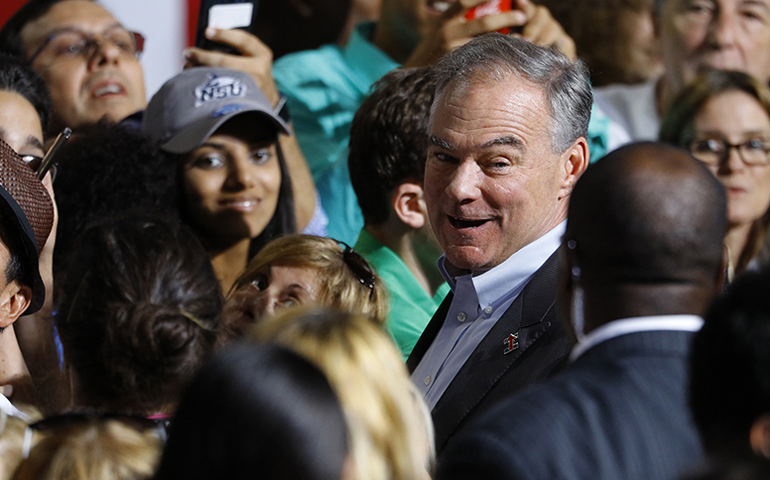
Sen. Tim Kaine, D-Va., July 23 in Miami. (Photo courtesy of Reuters/Scott Audette)
Days after vice presidential candidate Tim Kaine expressed hope that the Catholic church may someday alter its teachings toward same-sex marriage, several U.S. bishops are saying not so fast.
At an event Saturday for the Human Rights Campaign, Kaine, who is Catholic, addressed his own path to supporting same-sex marriage and predicted his church might one day end its opposition, as well.
"My support for marriage equality now -- my full, complete, unconditional support for marriage equality -- is at odds with the current doctrine of the church that I attend. But I think that's going to change, too. I think that's going to change, too. And I think it's going to change because my church also teaches me about a creator, in the first chapter of Genesis who surveys the entire world, including mankind, and said, 'It is very good, it is very good,'" said Kaine.
In a statement Thursday, the heads of U.S. Conference of Catholic Bishops' committees on doctrine and on marriage and family life attempted to douse any such hopes for revision.
"The Catholic Church's teaching on marriage as exclusively the permanent, faithful, and fruitful union of one man and one woman cannot change," read the statement titled "God's Plan Doesn't Change."
The joint statement was signed by Detroit Archbishop Allen Vigneron, chair of the Committee on Doctrine, and Buffalo, N.Y., Bishop Richard Malone, chair of the Committee on Laity, Marriage, Family Life and Youth. It began by saying "it is timely to reaffirm" the church's teaching on marriage, but went no further in specifying what triggered such timeliness.
"The attempt to redefine the essential meaning of marriage is acting against the Creator. It cannot be morally justified," said the bishops, who cited the Catechism of the Catholic Church -- "The vocation to marriage is written in the very nature of man and woman as they came from the hand of the Creator" -- and also quoted Pope Francis in his environmental encyclical Laudato Si' and apostolic exhortation on marriage and the family Amoris Laetitia.
The bishops appeared at one point to respond to a specific portion of Kaine's comments at the dinner hosted by Human Rights Campaign, which advocates for LGBTQ equality.
In his speech, the Virginia senator referenced Francis' now-famous "Who am I to judge?" statement, made in response to a question about gay priests, before saying, "I want to add: Who am I to challenge God for the beautiful diversity of the human family? I think we're supposed to celebrate it, not challenge it."
In their statement, Vigneron and Malone said, "We cause great harm to ourselves, to each other, and to the world when we ignore the moral law given to us by God and inscribed in our very nature. The goodness and beautiful diversity of God's creation does not include those things that are consequences of our sins."
A day earlier, Bishop Francis DiLorenzo of Richmond, Va. -- Kaine's home diocese -- issued his own statement on the church's teaching on marriage, saying "More than a year after the U.S. Supreme Court's ruling on marriage, and despite recent statements from the campaign trail, the Catholic Church's 2,000-year-old teaching to the truth about what constitutes marriage remains unchanged and resolute."
He added, "Redefining marriage furthers no one's rights, least of all those of children, who should not purposely be deprived of the right to be nurtured and loved by a mother and a father."
New Ways Ministry, a Catholic LBGT ministry, thanked Kaine for his sentiments, saying they are shared by other American Catholics. Polling from the Pew Research Center shows 58 percent of U.S. Catholics support same-sex marriage -- a higher percentage than Americans overall.
Related: Spiritually motivated: How Tim Kaine navigates his faith and politics (Aug. 25, 2016)
Once opposed to same-sex marriage, Kaine said his stance changed in 2005, though he had worked before then against LGBT discrimination. Still, some LGBT groups criticized his past reluctance to describe his support of marriage equality, instead opting at different times for civil unions and "the legal equality of relationships."
The bishops' statements mark the second time in two months American prelates have obliquely responded to words or actions of politicians regarding same-sex marriage.
In August, three bishops, without directly stating his name, rebuked Vice President Joe Biden for officiating over the civil marriage between two men who were longtime White House staff members.
"When a prominent Catholic politician publicly and voluntarily officiates at a ceremony to solemnize the relationship of two people of the same-sex, confusion arises regarding Catholic teaching on marriage and the corresponding moral obligations of Catholics. What we see is a counter witness, instead of a faithful one founded in the truth," read a blog post authored by Malone, USCCB president Archbishop Joseph Kurtz of Louisville, Ky., and Miami Archbishop Thomas Wenski, chair of the U.S. bishops' Committee on Domestic Justice and Human Development.
The bishops' critique of Biden came four days after the ceremony; likewise, the latest marriage statement posted four days after Kaine made his comments in Washington, D.C.
[Brian Roewe is an NCR staff writer. Follow him on Twitter: @BrianRoewe.]
